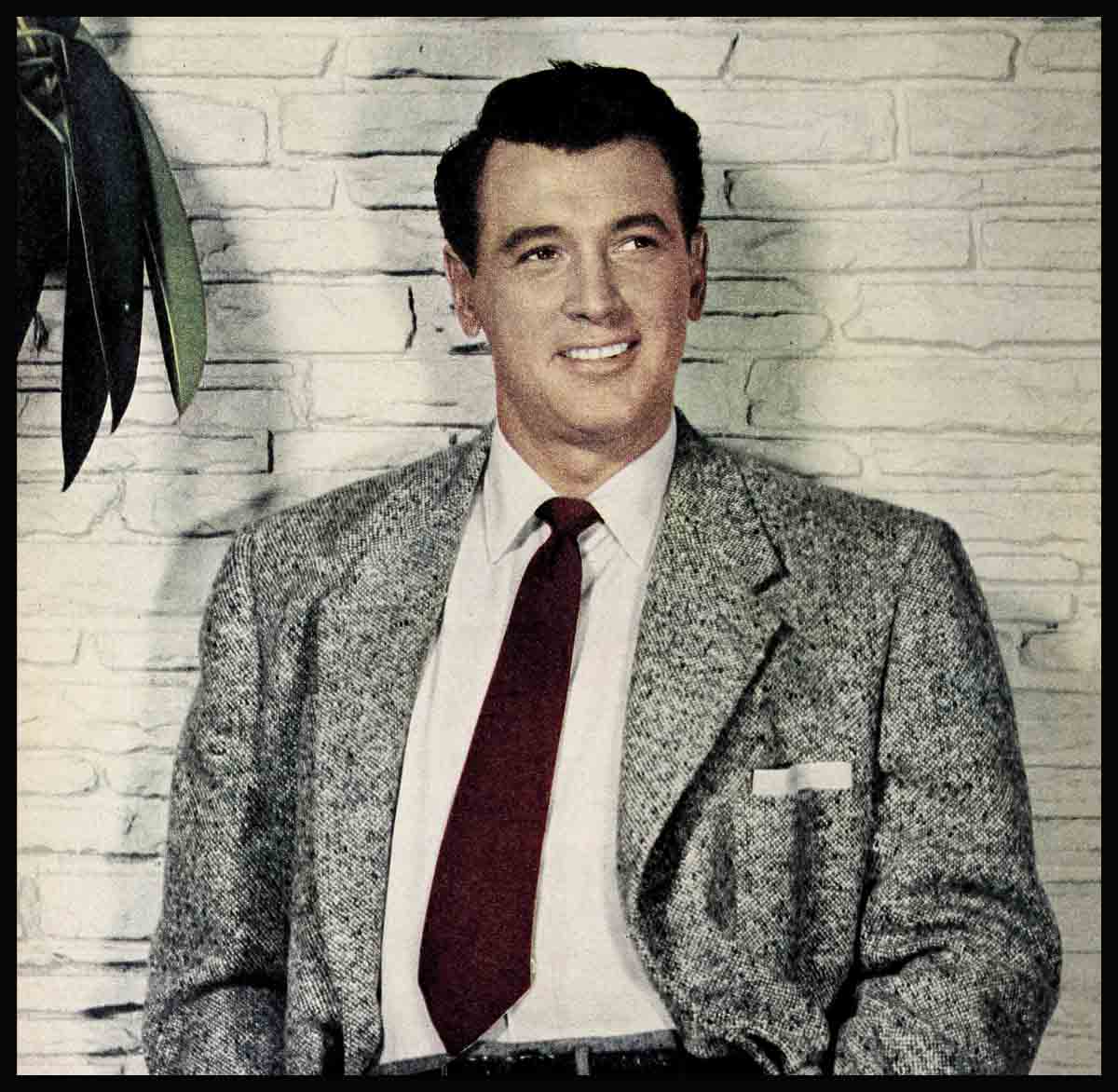
Rock Hudson’s Love Affair With The USA
The big ship was slowly steaming up toward Staten Island. In the distance beyond, New York was rising out of the sea, the towers and spires of Manhattan rearing into the blue sky like a fairy city, its million windows sparkling in the sun. At the left, another island came into sight, then slowly drifted by—Bedloe’s Island, the Statue of Liberty greeting another Queen—the “Queen Elizabeth.”
“What’s the matter, Rock?” one of the passengers who were clustered at the rail asked the young giant standing there with a dreamy, faraway look in his eyes. “Aren’t you glad to be home? Why so quiet?”
Rock smiled. Sure, it was good to be home, awfully good. But why was he so quiet? What could he answer? With the thoughts and memories whirling in his head, emotions tugging at his heartstrings, he had a tough time keeping the tears out of his eyes. He couldn’t speak.
Rock had forgotten. He’d been away four months and he’d forgotten. Forgotten how much all this meant to him, forgotten how lucky he was that he was an American who could come back to this country and call it his own; a country where a lad from the wrong side of the tracks could afford to dream, dream anything he cared—to become a movie star in his case—and have a chance to make the dream come true.
It was silly, wasn’t it, how he could have lost consciousness of it for even a minute? But he had. Only the sight of the Lady with the torch, the girl he’d left behind him, had brought it flooding back to him.
For Rock had enjoyed himself; let there be no mistake about it. “I’ve had a terrific time. Europe was wonderful. I can’t believe it’s over so soon,” he was to tell reporters shortly after his arrival in New York. This had been his first real vacation after several years of almost uninterrupted work. He’d gone to Ireland to make “Captain Lightfoot,” but had found time both before and after the filming for sightseeing and fun on the Continent. No, he hadn’t been homesick while he was away; he’d been too busy for that. Only now, as he was gliding toward his native soil, did he feel the pang of homecoming. He’d kissed the Blarney Stone while he was in Ireland, and later he was to talk volubly about his trip to whoever was willing to listen, but at the moment he was too choked up to say much.
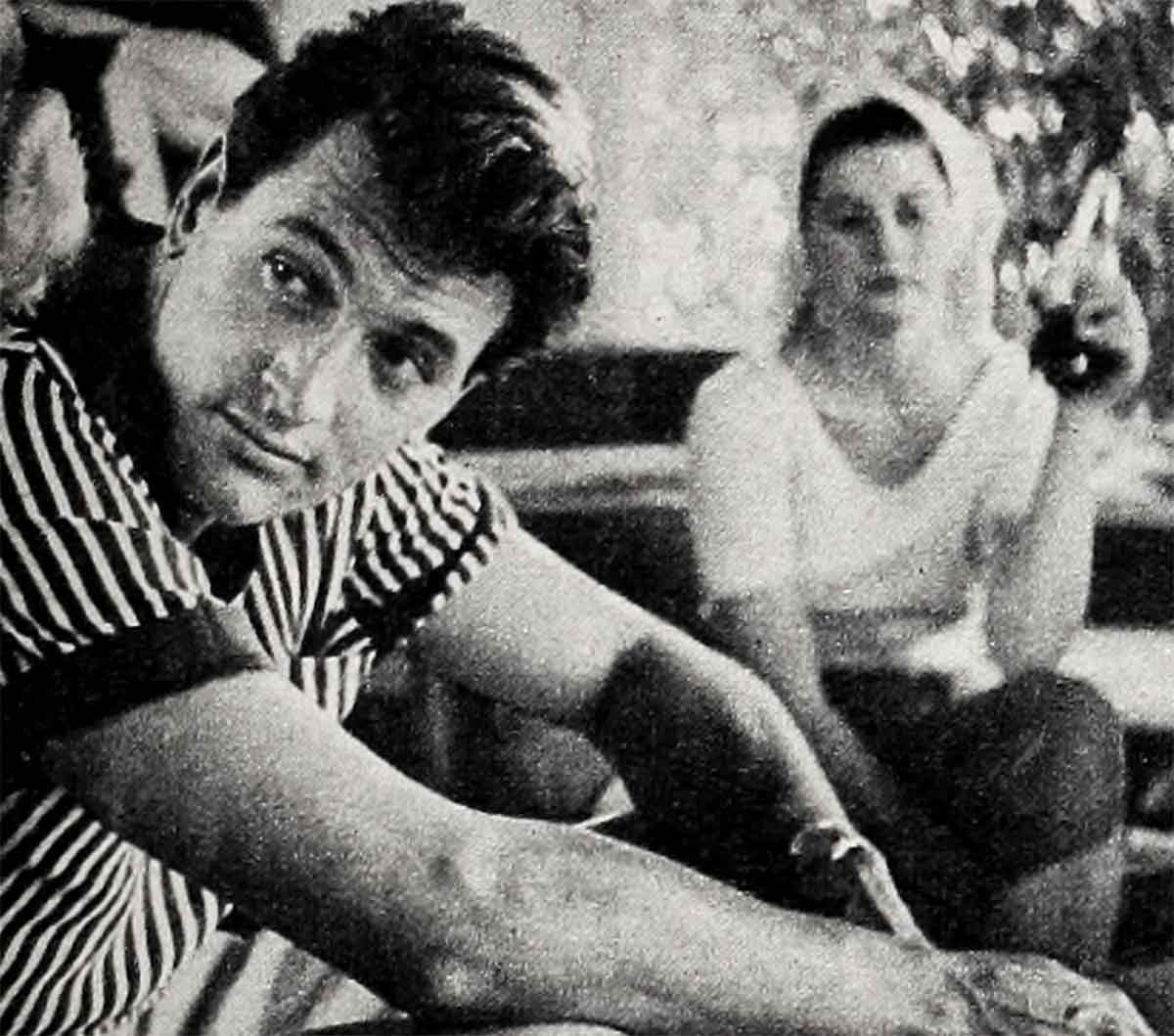
Perhaps, as he was approaching New York, he was thinking of another fairyland city built on the water’s edge—Venice. He’d loved Venice. Exploring her canals by gondola and motorboat, strolling through her streets, feeding the pigeons in St. Mark’s Place, he’d loved her gaiety, and color and scenic beauty. He’d had fun at the Lido, Venice’s famous beach and resort area, water skiing on the deep blue, mirror-smooth Adriatic. And he’d attended the film festival with Scott Brady, the only other Hollywood representative there. Venice was wonderful.
But Rock also remembered the blind, ragged beggar groping his way through one of the busy streets. He’d been in a gay, carefree mood and the sudden sight had jarred him out of it, he couldn’t say why. There had been the painfully thin little flower girl, going from table to table selling her wares; and—in Rome—the bent old woman drawing a bucket of water from one of the fountains, right in back of Rome’s most luxurious hotel. The sights had registered, but only now, as he was passing his Lady of Liberty, did he grasp their significance.
“We’re taking too much for granted. We don’t know how lucky we are in this country,” he was quoted later. Rock, returning from abroad, realized it was fortunate indeed to be born an American.
Rock, too, had known hard times as a youngster. He’d worked in a grocery store after school, carrying packages out for the customers, and he’d had a paper route. The little he earned in these jobs wasn’t spending money. He gave it to his mother to help out with the skimpy family budget. Once, he and his mother lived for a whole week on nothing but bread and potatoes. His mother had too much pride to ask her family for help, but one day his uncle Jim stopped by and saw the situation. “Is this all you have to eat?” he asked, and without another word went out and brought back a big basket brimful with groceries, including some candy for Roy. And always his mother managed to scrape up a dime to send him to the movies on Fridays when all the other kids went. They were poor all right, but it wasn’t the grinding poverty he’d seen abroad. Poverty without hope.
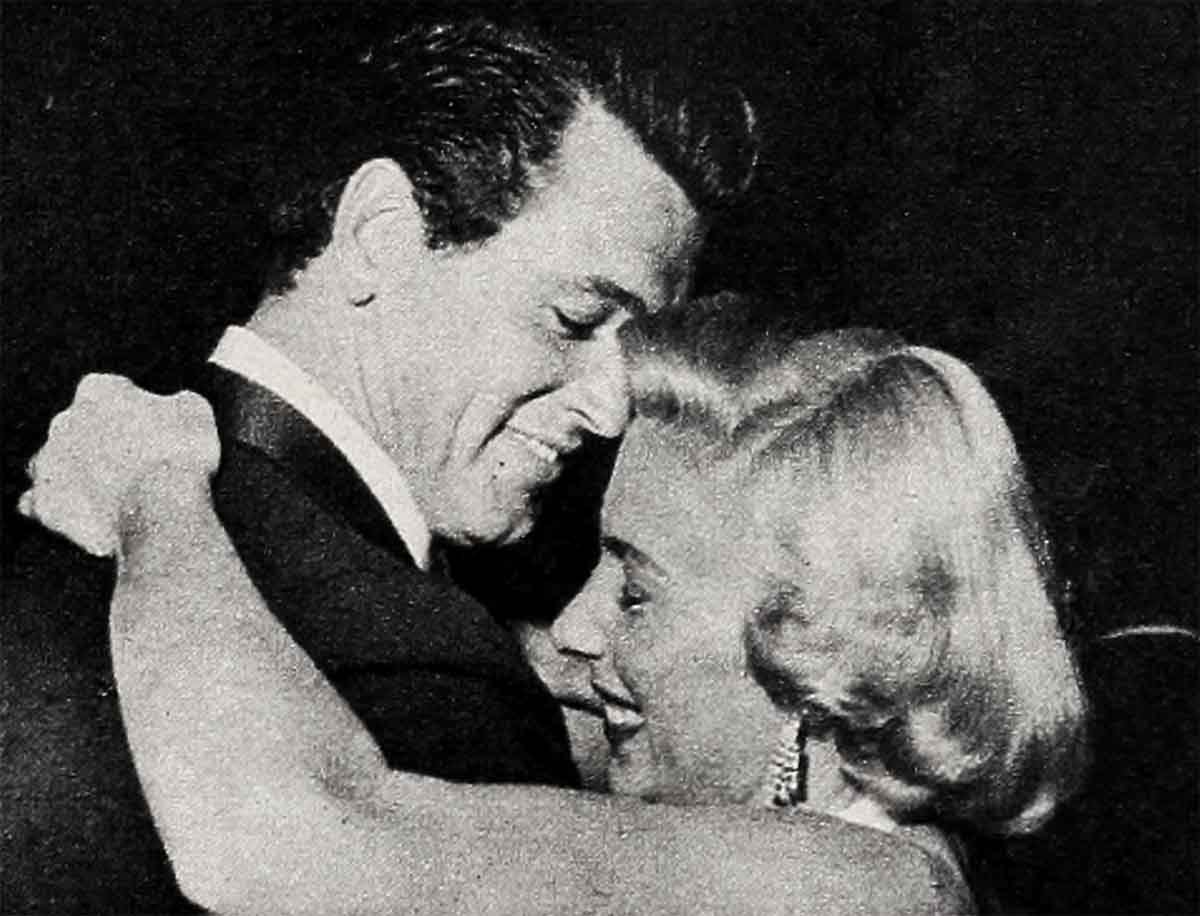
And there was another difference, one that meant even more. There was equality. To many people abroad equality has become a shopworn slogan, lacking real meaning, but for Rock it had once again all the brightness and luster the idea had had for our forefathers.
Rock was born Roy Fitzgerald in the ritzy town of Winnetka, Illinois, where his father had been a garageman before his parents were divorced. Being a poor kid in a rich town was no barrier for Roy, however. He was one of the crowd, going to the same school, being invited to the same parties, going to the same movies and having his cokes and hamburgers at Cooley’s, the soda fountain where all the other kids used to hang out. And when his friends took dancing lessons, the mother of one of them paid for Roy’s. The day he graduated from New Trier High School he could face the future on equal terms with all his school chums. Just because his folks didn’t have much money didn’t mean that Roy belonged to an inferior social class. EqualIty for Rock was more than a slogan.
Perhaps that helped him get on so well with Europeans. He didn’t patronize them. “They’re the friendliest people in the world if you try to meet them on their own ground, sort of make an effort to speak their own language,” he said.
Rock did just that, and it was no effort for him. He enjoyed the sense of adventure and excitement he derived from being abroad, hearing foreign languages spoken around him, seeing foreign customs and foreign surroundings. Instead of comparing what he found abroad to what he’d left behind, he plunged into the foreign scene with the same zest with which he plunges into the sea when he’s surfboard riding at Leguna Beach. Differences delighted him.
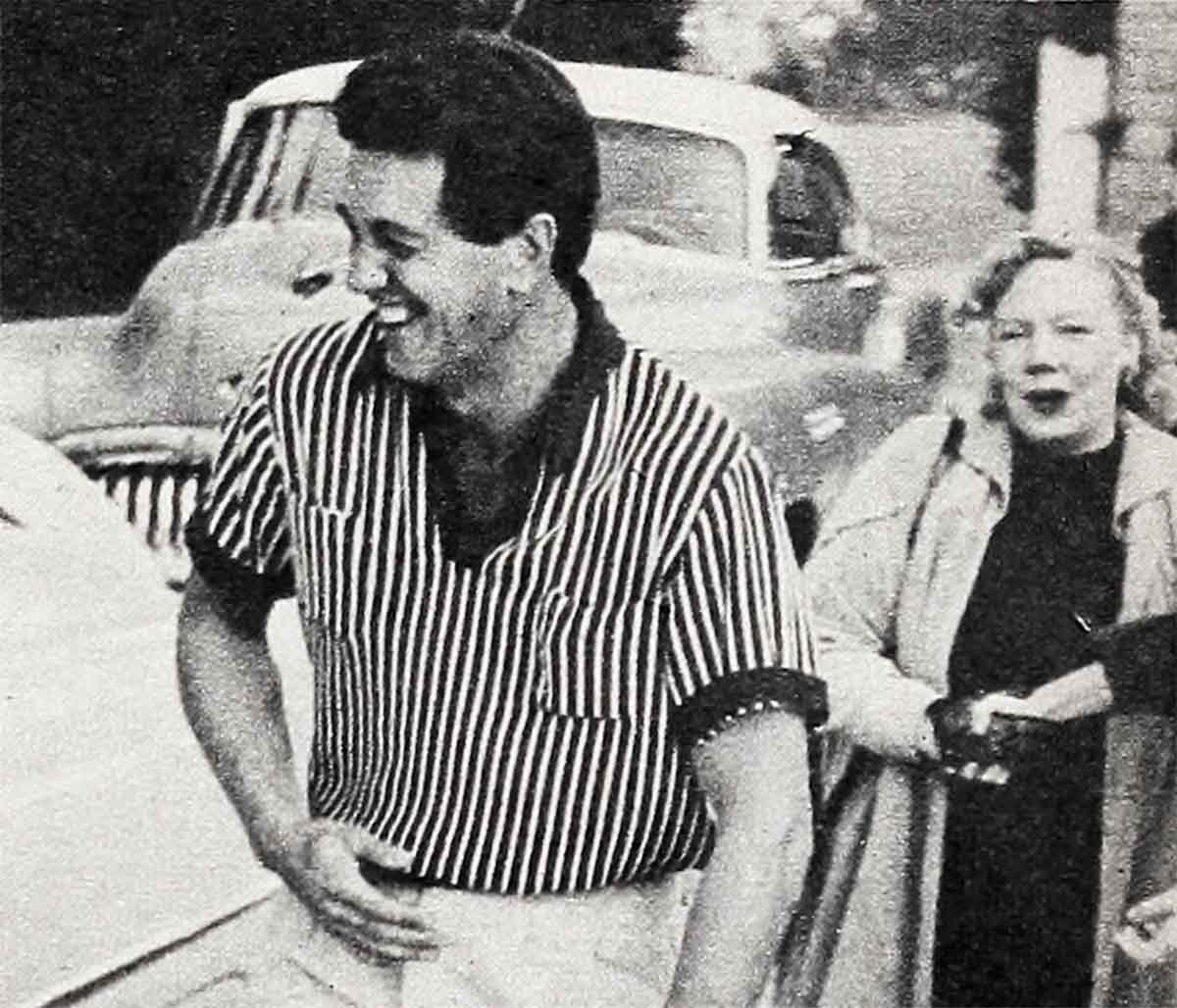
In Florence, he stayed at a small pensione, a tourist boardinghouse, in a room with an old-fashioned brass bedstead, a washstand in a corner, and without a private bath. But he liked that room. The window overlooked the river Arno, right near the Ponte Vecchio, the famous old shop-lined bridge. Instead of complaining about the lack of modern comforts, he was thrilled to be in an atmosphere that was so different from home.
And he put his mind to learning a little of the language of each country he visited, picking up a little French and a little German, and more Italian. He has an ear for languages and an actor’s facility for verbal mimicry. At the end of his stay in Italy he could rattle off Italian phrases like a native. “It’s not so difficult learning something you like to do,” he would comment on it to his amazed listeners.
Rock is an expert, of course, at learning what he really likes to do. In his first picture, “Fighter Squadron,” he had only one line to speak. “You ought to get a bigger blackboard.” He fluffed it thirty-eight times, saying, “You ought to get a bligger back board,” before he got it right. However, in his most recent picture, “Magnificent Obsession,” he was acclaimed a first-rate dramatic actor.
In planning his vacation, it would have been easy for Rock to follow a Cook’s tour of the famous places, staying at big luxury hotels only where he could have rubbed elbows with the international set. But Rock wanted more than that. He really was interested in the countries and the people he visited and wanted to see as much of them and get as close to them as possible. On his trips before and after the filming of “Lightfoot,” Rock rented a car, traveling and staying wherever his own or his companions’ whim told them to. Rock was with Betty Abbott and Barbara Rush and while they didn’t avoid resorts like the Lido, the Riviera, or Capri, neither did they head for them straight. Mostly they stayed in small towns along the way, spending an average for the trip of only six dollars a day for room and board per person.
The “Queen” was in her berth, and Rock proceeded down the gangplank to the customs inspection. It felt good having American soil under his feet once again. And after crossing and recrossing some two dozen frontiers during the past four months, Rock had become an old hand at baggage inspection.
“Did you buy anything abroad?” the inspector asked him.
There was quite a raft of things—Faience and Wedgwood for his mother, a new 8mm movie camera he’d bought in Germany, silk shirts from Florence, cuff links from Venice, other gifts for his friends.
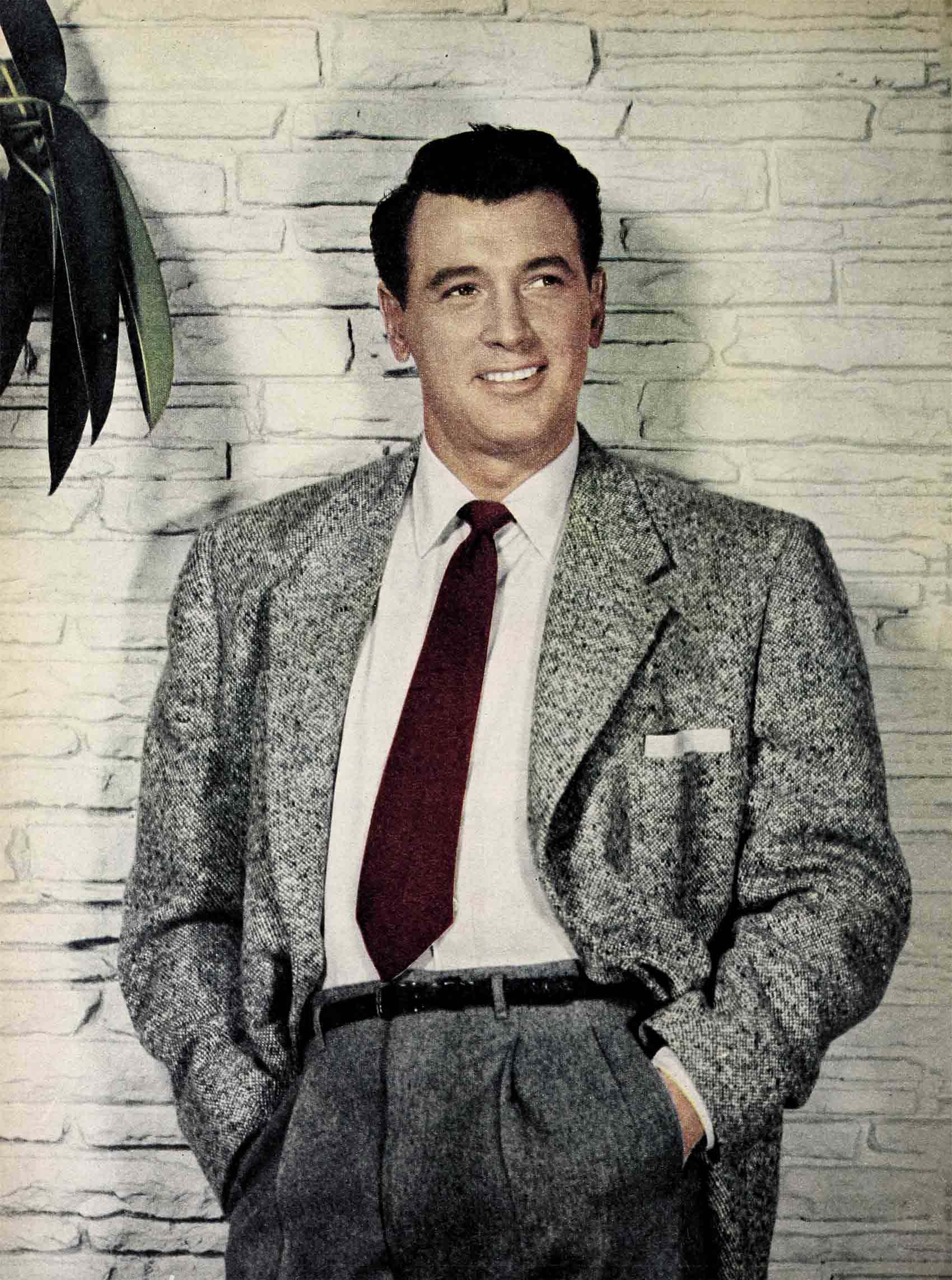
“Any perfume?”
“No,” he grinned. “No perfume.” Betty, after all, had been in France, too.
He’d met the girls in Paris, flying back from Rome. He had intended spending a week there alone while waiting for Barbara and Betty to join him, but it had rained in Paris, and if there’s one thing Rock doesn’t like, it’s rain. He’d walked around hunched up for a couple of days till he passed an Italian travel agency. Unable to resist the lure of the posters, he stepped inside. An hour later he was on the plane to Rome.
What a city that was, aside from the warmth and sunshine Rock loves so dearly Rome was one place that got under his skin fast. Later he visited Naples and considered that the high spot of the entire trip, but Rome made a terrific impact on him. Walking amidst the ruins of edifices that had been there well before the birth of Christ gave Rock a sense of awe, an awareness of history he’d never been able to conjure up from his text books at New Trier High in Winnetka. He gasped at the sight of St. Peter’s and found himself deeply impressed by the charm, beauty and grandeur he encountered each time he turned a corner in the Eternal City. He loved the fountains, the open-air: flower markets, the little restaurants and sidewalk cafes. At his hotel he’d run into Ginger Rogers and her husband, Jacques Bergerac, and the three of them spent several days together. One night Ginger and Jacques took Rock to the Coliseum. Lit up by a full silvery moon, the sight was so beautiful he could hardly tear himself away. If Betty had been there—who knows?
Rock would have stayed on in Rome indefinitely, but he’d forgotten to wire the girls and had to fly back to Paris to meet them there. They rented a car and immediately headed south again.
“Those crazy drivers in Paris,” Rock thought with a smile, as he was getting into a cab at the pier. The way they whizzed around in their little cars, making enough noise with their horns to drown out the trumpets at Armageddon. It was a good thing he’d once been a truck driver and knew how to take care of himself. He’d heard of people circling around the Arc de Triomphe for a couple of hours before they finally got back into the outside lane.
That was another thing, he thought, that he hadn’t fully appreciated before he’d been abroad. Where but in this country could a man be a truck driver without losing caste, without having it make any difference to his status or future career? People abroad were constantly amazed that such a thing could happen. And he made a point of mentioning his truck driving background frequently. He was proud of having once earned his living with his back and his hands. He’d wanted to go to college after he came out of the Navy, but, when he couldn’t get in, driving a truck was the next best thing. It didn’t stop him from continuing to dream of a movie career, a dream he’d been spinning since he was a boy of ten when he’d seen Jon Hall dive off a ship into a blue lagoon before the admiring eyes of Dorothy Lamour.
Nor did it stop him from doing something about it. With borrowed money he had some good photographs made of himself, screwed up his courage to present them at a studio, got a hearing and was hired. “In America,” he often thought of telling his new friends in Europe, “anybody can be anything he wants to be and is equipped to be.”
Once an Italian gentleman cornered Rock in a hotel lobby and gave him a long lecture on all the things that were wrong with America. While going on with this harangue, he kept ordering a waiter around, talking to him gruffly and altogether making the poor man jump. “How then,” he wound up his catalogue of grievances, “how then can you call yourselves a democratic nation?”
Rock had sat patiently waiting for the gentleman to finish. “I’ll tell you why we can,” he now said gently. “It’s because if anybody in our country were to treat a servant the way you have pushed around this waiter, he’d get his coffee in his face instead of his cup.” The gentleman, Rock reports, departed rather hurriedly.
As a star who is almost as well known in Europe as he is in this country, Rock had been told that he would be very much in the limelight as a representative of America and must, therefore, be on his best behavior. The admonition was hardly necessary, for Rock has a natural courtesy that wins him friends wherever he goes.
People may have their peculiarities—here as well as abroad—but Rock doesn’t mind that. He got along with everybody—garage mechanics, chambermaids, customs inspectors, hotel clerks or elderly landladies. That smile of his will melt any female, of course, but he had just as little trouble with the men, language barrier or none. Many people in Europe, he found, spoke at least a little English, and everybody appreciated his own efforts to speak their language. Besides, he’s a nice, unassuming guy. People like him.
“Did you find much hostility towards Americans? Did people try to take advantage of you?” These were questions he was asked time and again during the course of several radio, television and press interviews he gave directly after his arrival in New York. His answer always was an unqualified “No” to both questions. No one had shown him any ill will. No one he’d talked to, with the exception of the man quoted above, had been hostile to America. No one, without exception, had tried to take advantage of him.
Once in Paris their bill at a restaurant had seemed too high. Rock had been warned that would happen, so on principle he and the girls checked each item against the menu. After poring over it for some time they came to the shamefaced conclusion that there was indeed an error in the bill—an error in their favor.
“See, Father?” Betty had said. “It doesn’t pay to be suspicious.” Betty usually calls Rock nicknames like “Father” or “Igor.”
Another question Rock was asked frequently was how he’d liked the foreign cuisine. Rock has long been famous for his appetite. He’s a big man—an English girl once looked up at him and exclaimed, “Blimey, you’re no Rock. You’re a bloom-in’ cliff”—and his hunger is proportionate to his size. Director Raoul Walsh, who has worked with him in several pictures and knows him well, has described him as capable of eating a ton of ice cream and twenty pies, and he’s warned prospective hosts that he’s liable to eat his dinner, theirs and a third. But Rock has always been a steak and potatoes man and he was a little leery at first of the fancier dishes served overseas. Being blessed with a cast-iron stomach and his genuine preference for food—any kind of food—he managed the switch easily though.
He’s always loved spaghetti and has since added a string of other Italian specialties to his list of favorite dishes—ravioli—lasagna—scallopini—minestrone—prosciutto—scampi—he’ll rattle them off without pause, getting a dreamy look.
This unusual event occurred at the famous old Elephant’s Inn, just south of the Brenner Pass in Northern Italy, where Rock rashly ordered the specialty of the house, the Elefanten Platte.
It’s a platter the size of a bridge table top, laden with steaks, chops, roasts and other assorted meats, garnished with potatoes and vegetables. Not within living memory have any three strong men been able to finish it in one sitting. Rock tried, but like all the others had to give up. The Elefanten Platte proved too much.
Within thirty-six hours after his arrival in New York, Rock was on a plane winging his way back to California. His vacation over, he was anxious to get home. He had to dub in the picture he’d made in Ireland and he had to find and move to a new home as his lease was up for his old house. Soon there would be another picture, and then another. It was work, but it was fun, more fun even than traveling. He looked forward to it.
In back of him the sun was rising into the sky, slowly, ever so slowly, with the plane speeding away from it. Below, the country was spread out like a checkerboard. He couldn’t take his eyes off it. Now they were crossing the Rockies. He was thinking of Switzerland. A man didn’t have to travel six thousand miles just for scenic beauty, he thought. These, our own mountain ranges, were just as impressive.
But then, that wasn’t the point of traveling. He’d gone abroad to see the world, learn how other people lived, gain a little more understanding. He hoped he had succeeded. He thought he had. Foreign tongues, foreign faces, foreign customs—he’d learned to respect things foreign, all the while learning to appreciate his own country more. For a country kid he hadn’t done so badly. He felt he’d grown during those four months he’d been away.
Above San Bernardino now he could see a blue strip of the Pacific on the horizon. A few more minutes, and the plane would land. He’d be home again, back in the warmth and sunshine of California, back with his friends, his mother, his work. It was good to be home. And it was good to have been away.
A few more minutes to reminisce. Already it was more like a dream—Paris, the Alps, the Italian lakes, the Riviera, Venice, Florence, Rome, Naples. Especially Naples. Vedi Napoli e poi mori, he murmured to himself. “See Naples and die.” “Ciao,” he smiled, saying goodbye to the receding memory of his trip.
The plane landed. Rock rushed down the runway. The traveler was home.
THE END
It is a quote. PHOTOPLAY MAGAZINE JANUARY 1955




